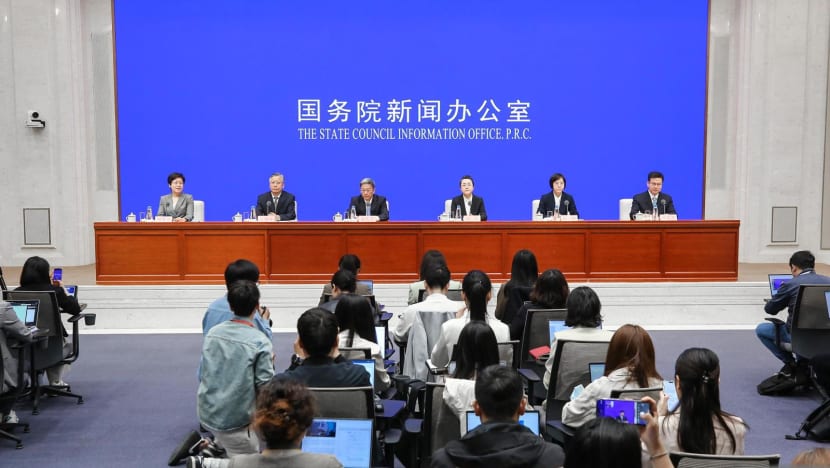analysis East Asia
What is ‘deep sea fishing’? Private firms get protection under China’s new law
China’s new Private Economy Promotion Law, effective May 20, targets arbitrary enforcement and protects business rights. It marks the country’s first dedicated law for private sector support.

China's Xi Jinping chairs a symposium on private enterprises in Beijing on Feb 17, 2025. (Photo: Shen Hong/Xinhua via AP)

This audio is generated by an AI tool.
SINGAPORE: When Guangzhou-based medical tech company ARC Health, known as Yijiankang in Chinese, filed for their initial public offering (IPO) in Hong Kong in June 2023, after posting more than 2.42 billion yuan (US$335 million) in revenue, the future looked bright.
But things would take a dramatic turn.
Just months later, 1,600 police officers from Henan province travelled over 1,400km to Guangzhou to conduct a cross-provincial enforcement operation against the firm, in connection with fraud allegations amounting to 600,000 yuan.
Hundreds of employees were interrogated, according to local media reports, and more than 60 bank accounts partially or fully frozen - affecting hundreds of millions of yuan in funds.
After suspending factory operations, ARC Health moved to withdraw its Hong Kong IPO plans in March 2024.
The case is among nearly 10,000 incidents involving Guangdong-based firms reportedly targeted by cross-provincial enforcement, according to a report by the Guangdong Provincial Situation Research Centre, which noted that survival had become “unsustainable” for many private businesses.
This phenomenon is also called “deep sea fishing” - similar to how fishermen venture far out to sea for a better catch.
Cases have been on the rise in cities like Guangzhou, Shenzhen and Dongguan - key hubs for China’s tech, innovation and manufacturing industries.
Observers say such cross-regional crackdowns are often aimed at generating revenue for cash-strapped local governments under pressure to meet performance targets - at the expense of the private economy.
Security firms and local police officers have also reportedly been venturing into cities and provinces outside their jurisdiction to intimidate business owners over made-up or exaggerated criminal charges.
In response to such concerns, the Private Economy Promotion Law (PEPL) - which comes into force on Tuesday (May 20) - introduces several legal safeguards which include protections for companies vulnerable to arbitrary law enforcement, and provisions to hold officials accountable if they breach the law.
“The new law is an important and welcome piece to the puzzle to increase confidence in the Chinese market,” Sebastian Wiendieck, a partner at legal advisory and tax consultancy firm Rodl & Partner China, told CNA.
CHINA’S FIRST PRIVATE SECTOR LAW
China is seeking to grow its private sector as it strives to reach its 2025 economic growth target of around 5 per cent.
Private enterprises are crucial to China’s economic recovery, contributing more than 60 per cent of GDP, 80 per cent of urban employment and making up 92 per cent of all businesses in China, according to a government statement.
Comprising 78 articles in nine chapters, the PEPL will cover areas like fair competition and rights protection, as well as provide regulatory guidance and support.
The law “will directly address long-standing concerns” from private enterprises, like excessive inspections, arbitrary fines, and profit-driven local law enforcement, said Wang Zhenjiang, China’s vice minister of justice on May 8.
Under the new law, targeted measures would include “establishing a complaint and reporting handling mechanism for administrative law enforcement violations, and liaison points to enhance communication between law enforcement supervisors and enterprises”, Wang said.
“It’s a clear top-down signal to all levels of the Chinese government as well as state-owned enterprises about the importance of private enterprises and entrepreneurs in China’s long-term development,” Wiendieck said.

The new law could help restore confidence in China’s battered private sector, experts told CNA, especially as businesses navigate external headwinds amid an unprecedented global trade war.
Dr Tian Xuan, vice dean and chair professor at Tsinghua University’s PBC School of Finance, said the PEPL is “more comprehensive and systematic” compared to previous laws and regulations.
“It is China’s first foundational law dedicated specifically to the development of the private economy, and its legal authority is clearer and more forceful,” Dr Tian said.
Tang Dajie, a senior researcher with the China Enterprise Institute in Beijing, said the PEPL’s implementation marked a “substantive step forward”.
“The PEPL emerged in response to macroeconomic pressures and the need to align with market economy principles,” Tang said, adding that “the ultimate test lies in its enforcement”.
Xiaomi founder Lei Jun said the new law would address real challenges.
“(The PEPL) offers institutional safeguards for building a law-based, international and business-friendly environment, and gives private firms greater confidence and assurance in their development journey,” he wrote in an official state media commentary published earlier in May.
Companies on the ground like Guangzhou-based radio frequency identification (RFID) device maker G&G Smart Technology, welcomed the new legislation, saying various forms of support listed would be “very helpful for small and micro-sized enterprises”.
“The government has clearly recognised that businesses need coordinated national assistance,” said Gary Su, a company sales manager, adding that the policy’s mention of patent financing was also a good step.
“For our company, I personally hope there will be quicker and more convenient measures when applying for product patents.
“From what I know, the patent process can take over a year or even several years, depending on the project. Without patent protection, we’re worried that launching a product could risk it being copied.”
NEW ROLES FOR ASSOCIATIONS - BUT HOW EFFECTIVE?
In China, private businesses have traditionally been supported by various industry associations and chambers of commerce - which serve as bridges between the government and the business community.
While their roles have largely been limited to passing on information and connecting resources, experts said these groups will be expected to take on heavier responsibilities under the new law - from setting industry standards to resolving disputes and protecting business rights.
Fang Guanghua, vice-chairman of the All-China Federation of Industry and Commerce (ACFIC), said the federation would work to further empower private businesses and groups.
This includes accelerating legislation, expanding Party presence within chambers, and improving service delivery.
But some analysts are sceptical about whether newly empowered associations can act independently or remain tethered to official oversight.
Granting these organisations clearer authority could help improve dialogue between businesses and government, said Dr Tian.
“The new policy grants them greater authority … which will significantly enhance their voice and influence in the development of the private economy … reduce administrative interference, and raise the level of industry self-discipline.”
The effectiveness of the new law would very much depend on how autonomous these organisations are allowed to be, said Wang Dan, China director at the Eurasia Group.
“If they become genuine representatives rather than quasi-governmental intermediaries, they could help rebalance state-business relations and improve information flow from the ground up.”

The ultimate test now lies in the PEPL’s enforcement, analysts said.
Tang said a key signal would be the first administrative lawsuit filed under the new law.
“One benchmark would be the first administrative lawsuit citing the Private Economy Promotion Law, which would serve as a serious test of the law’s power and effect.”
Others questioned if entrenched behaviours, such as excessive enforcement and biased lending, would actually change.
“The law is a signalling effort rather than a structural reset,” said Wang.
“Confidence won't return without consistent policy implementation, regulatory restraint, and clearer guardrails for state-market boundaries.”

















